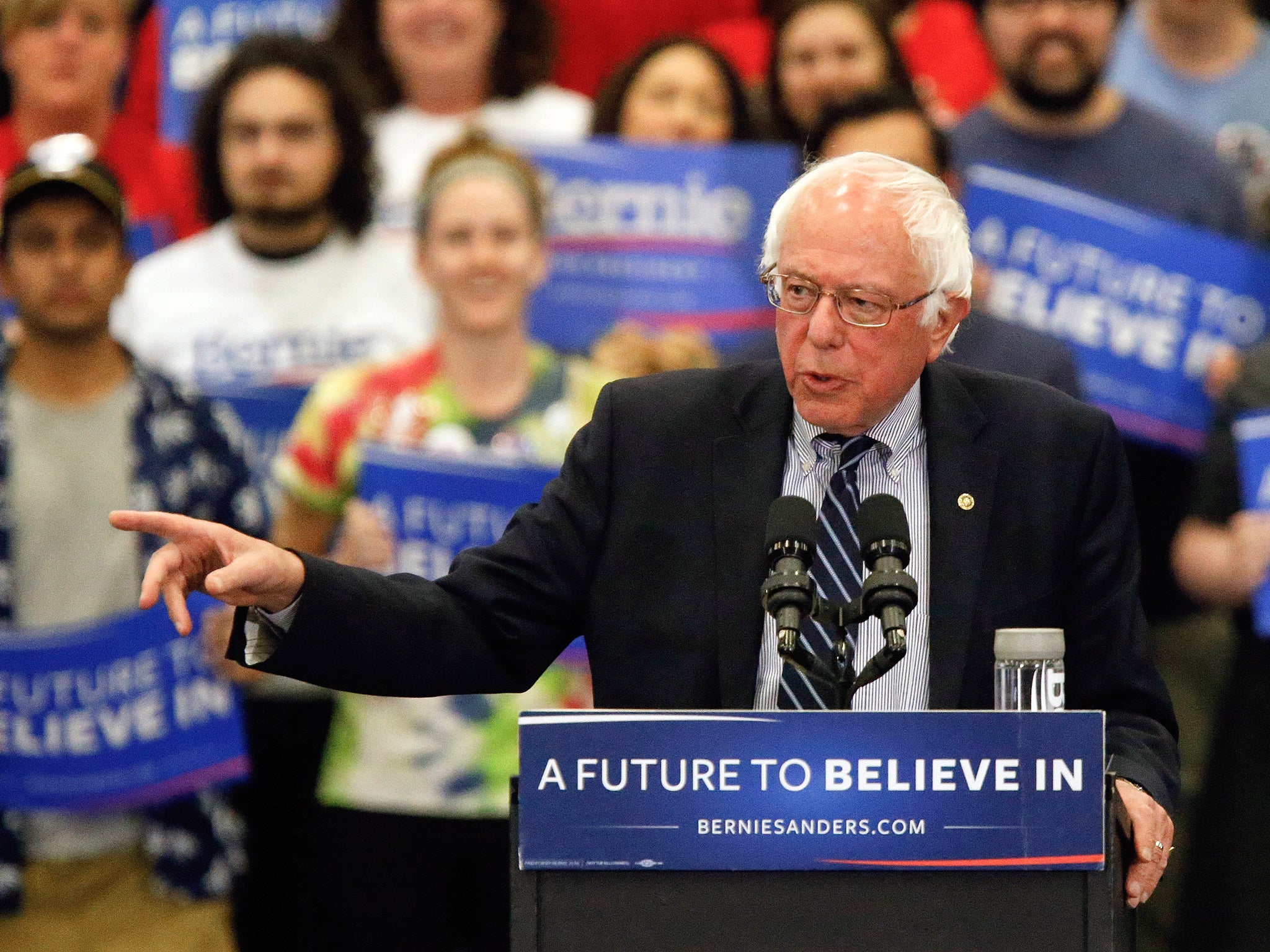Bernie Sanders lays off 'hundreds' of workers as pressure grows on him to quit race
After losses, Sanders campaign starts to downsize

Pressure is mounting on Bernie Sanders to end his campaign for the Democratic nomination and allow frontrunner Hillary Clinton to focus on battling Donald Trump in the general election.
But even after losing four out of five of Tuesday’s primaries, there is no evidence the Vermont senator intends to do so, or even that his supporters would automatically back Ms Clinton. However it emerged late on Wednesday that his campaign was laying off "hundreds" of workers across the country and would concentrate its resources on trying to win the California primary set for early June.
On Tuesday, Ms Clinton won Pennsylvania, Connecticut, Delaware and Maryland and took her delegate haul to 1,640, compared to Mr Sanders’ 1,331. He won just one state, Rhode Island.
Before the results came in, the 74-year-old had insisted he still had a “narrow” if unlikely path to securing the party’s nomination ahead of the convention in July.
But in a statement issued after the night’s figures emerged, his tone had shifted, even if he suggested he was going to stay in the race until the final primaries in June.
“I congratulate Secretary Clinton on her victories tonight, and I look forward to issue-oriented campaigns in the 14 contests to come,” he said.
“The people in every state in this country should have the right to determine who they want as president and what the agenda of the Democratic Party should be. That’s why we are in this race until the last vote is cast. That is why this campaign is going to the Democratic National Convention in Philadelphia with as many delegates as possible to fight for a progressive party platform.”
Conceding in an interview with the New York Times that his campaign would be downsizing, Mr Sanders said it would involve "hundreds of staff members". He insisted, however, that part of the reason was that 40 US states have already voted in primaries or caucuses. He also said that should he win the nomination everyone let go now would be rehired. That, however, looks like a very distant prospect.
For her part, rather than simply reveling in her victory, Ms Clinton appeared to show she realised the need to reach out to Mr Sanders and his supporters if she is to unite Democrats around her, moving into November’s showdown.
Speaking to her own supporters in Philadelphia, she said: “Whether you support Senator Sanders or you support me, there’s lots more that unites us than divides us.”
It is unclear what Mr Sanders is prepared to do in terms of urging his supporters to back the former secretary of state if she does indeed become the party’s candidate.
Speaking earlier this week in Philadelphia, where he was responding to a question from a member of the crowd, he said: “We’re not a movement where I can snap my fingers and say to you or to anybody else what you should do, that you should all listen to me. You shouldn’t. You make these decisions yourself.”
It also remains far from clear just how many of Mr Sanders’ supporters would rally around Ms Clinton as a candidate. Indeed, Mr Sanders has spent much of his time condemning the former secretary of state for taking money from corporate interests and has even suggested she was not qualified for the presidency.
Polls show she has a huge disapproval rating. An average of polls collated by the Huffington Post suggested Ms Clinton had a “favourable” rating of just 38 per cent, while her “unfavorable” rating was as high as 56 per cent.
Earlier this week, at a rally Mr Sanders held at Philadelphia’s Drexel University, a number of supporters told The Independent of their “Bernie or Bust” sentiment. While some said they would back Ms Clinton, some said they would rather not vote at all, or even support Mr Trump.
“It’s very tricky,” said Larry Kosta, a retired investor who was among the hundreds obliged to sit and watch the rally on an overflow screen. “I would vote for Hillary because I am a Democrat. But I have many friends who say it’s Bernie or bust. And that is the problem if we don’t want a Republican president.”
Inside the sports hall, Pat Dieonato put himself in the Bernie or bust category. He said the former mayor of Burlington was a unique candidate.
“If Bernie does not become the candidate I won’t vote for Hillary Clinton. I would vote for Trump as a distant second. Bernie is the real thing,” said the estate agent.
His wife, Joanne, a registered Republican, said she would vote for Mr Sanders if he was the presidential candidate in the autumn, but not Ms Clinton. “I just can’t stand her.”
Another supporter of Mr Sanders, Anita King, said Ms Clinton was another “establishment” candidate. She added: “I think it will be hard for people to vote for Hillary Clinton.”
Many observers believe Mr Sanders will stay in the race as long as possible in order to extract policy concessions from Ms Clinton at the party’s convention in Philadelphia.
“His only realistic goal for a long time has been to accumulate delegates to maximise his influence with the eventual nominee,” said Larry Sabato, Professor of Politics at the University of Virginia.
“As Sanders says, he’s willing to help reunify the party if Clinton is ready to reach out and make some concessions. The concessions will be platform planks.”
Subscribe to Independent Premium to bookmark this article
Want to bookmark your favourite articles and stories to read or reference later? Start your Independent Premium subscription today.

Join our commenting forum
Join thought-provoking conversations, follow other Independent readers and see their replies